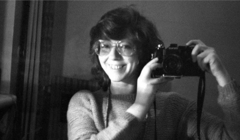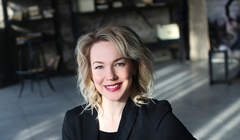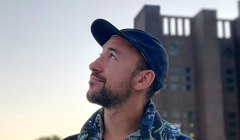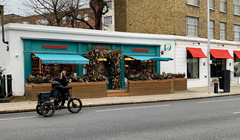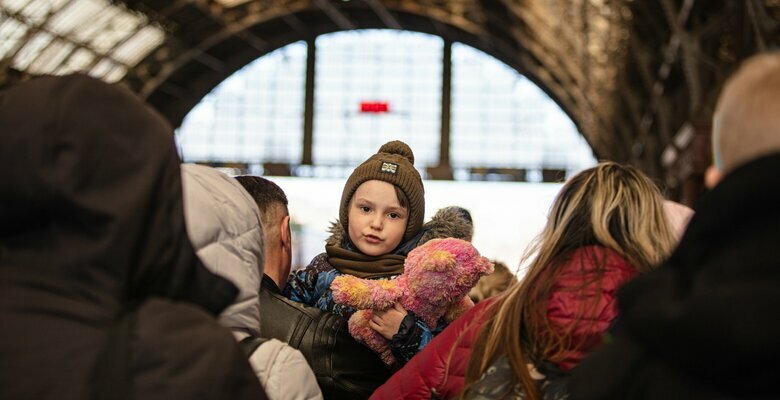
Almost four months have passed since the start of the war. According to UN data, by 1 June 2022, 6.9 million refugees had left the country. 2.1 million had subsequently returned. Many public organisations have criticised the UK’s sponsor programme for Ukrainians. The government site informs us that by May 24, the Home office had issued 115 thousand visas after having received 135 thousand applications. 60,100 Ukrainian citizens had entered the country.
Kommersant UK has compiled some personal stories of the difficulties encountered by Ukrainian refugees and by the volunteers who are trying to help them settle in these islands.
Part one. What the volunteers say:
‘There is the feeling that this is all just box ticking’
Michail Lagodsky, co-founder of ukwelcomesukraine.org, a non-commercial volunteer-run startup which helps refugees and sponsors to find each other
Finding The Right Match
Our organisation pairs Ukrainian refugees with British sponsors. Automatic matching, which happens when people find each other on the internet, is a minefield of cultural differences, differing domestic habits and different ways of thinking. There have been few truly negative stories, but lots of rumours because the press seizes on them and blows them out of proportion. Many sponsors suppose that handing over the house keys is the end of their mission, and are surprised when it turns out they have to help the refugees get settled in. We talk through these issues in the initial stages, and some sponsors change their minds. This is good, as it’s our job to manage the expectations of both sides.
We’ve set up a process with three stages. The Ukrainian Liaisons Department rings everyone who applies, and discusses practicalities. About twenty percent of candidates pull out at that point. If people respond favourably to what we have to say, then the next department takes their case over. This is Sponsor Liaisons. They verify lists of Ukrainians and look for suitable matches. Next, video calls are arranged with coordinator-interpreters, during which the Brits show the Ukranians their homes, and the Ukrainians show themselves. Only when they are satisfied and potential problems have been talked over do the case workers get involved, who help with the form filling for the visa. I should say that we only give technical and linguistic help, we can’t influence the result of the visa application. Each match takes several days to arrange and, inevitably, some of them fall through, but each day we help several families to find a new home.
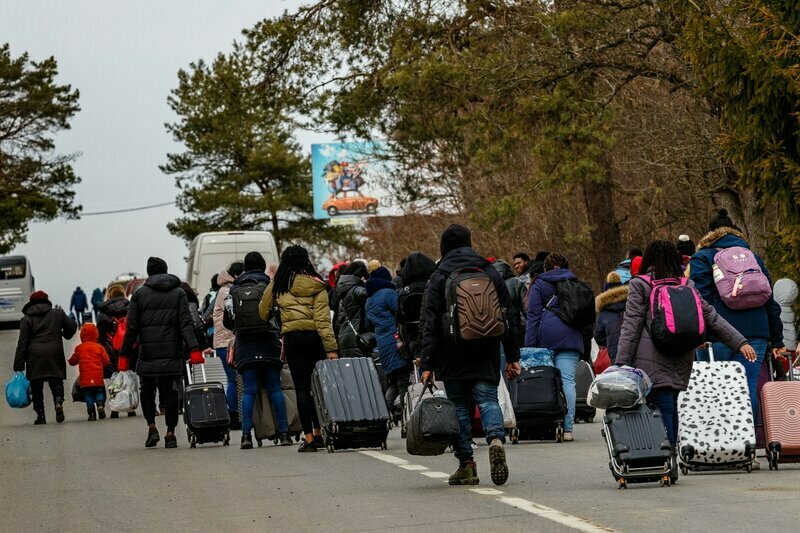
Governmental support?
There are many difficulties. Primarily, it’s the process of getting visas. The waiting period is unpredictable; from a few days to a few months. The process of submitting documents is rather complicated. Not all Ukrainians can do it themselves. The sponsors also have various questions. We perform the roles of interpreters and coordinators. The British government has issued instructions stating that the refugees should be provided with safety, a complaints process should be set up and that all service providers must have official registration.
And this all seems logical, but we find it frustrating because, instead of helping people directly, we have to go through the registration procedure, ensure we comply with the Data Protection Act and prove that we are law abiding. Personally I feel that it isn’t right. We aren’t a fund or a charity, we’re not asking for money and we have no bank account. We’re a volunteers’ association with about seventy active members. Amongst us there are professionals such as lawyers, programmers and managers. They are used to running things, so they have organised the work of this startup well. Everyone has a day job, a family and obligations and they’ve all got involved just because they want to help. It all started with personal initiative, with people helping their friends, and now we’ve got a good system going and we’re helping people we’ve never met. We want to help and we can.
The main task is to bring the refugee and the sponsor together and help with documents. That’s all. Although sometimes people come to us after they’ve already paired themselves up. The thing is that the local authority should organise the arrival of refugees, but there is no centralised system and there are no instructions about who they should turn to or who has responsibility for what. Each authority has its own rules. During the first month almost nobody came as they were all waiting for visas, but now the flow of refugees has intensified and a great many problems have come up. People are confused and often it turns out that the locals don’t know how the system works. We weren’t going to write instructions, but since people keep coming back to us with the same questions, we’ve started to.
The main uncertainty is where our area of responsibility ends. We try with all our might to find families which are suitable for each other and weed out suspect people, but all the same, we don’t understand what we are responsible for and what should be beyond our remit. The government could come to our help and propose clearer rules instead of creating an unbelievably complicated visa process or coming up with confusing concepts such as ‘registered providers’. In effect, our work as volunteers is helping the government to fulfil its own programme, and yet we are required to document every step we take. We are spending more energy dealing with the legal side, to protect ourselves from any allegations, than actually supporting refugees. There is the feeling that this is all just box ticking and that the government has designed the programme with the express purpose of ending the flow of refugees. There are no detailed explanations of anything, all the information is written in generalisations. Still, we have got through to some public bodies and we’re having productive discussions. They’ve already realised that the programme has imperfections, and they’re working on them.
Red flags
I hear about conflicts between sponsors and refugees which have led to people ending up on the street. We’ve never encountered it ourselves. However, if even one percent of the refugees who arrive here end up without a roof, then that means there are hundreds of people whose only legal recourse is to go to the local council and declare themselves homeless, as there is no procedure for changing sponsors. How quickly can they find temporary accommodation when there is a shortage of council housing in the country? This means that there was no prior thought given to this question. Is this also a teething problem?
I suspect that the wave of immigrants will soon receed and Ukrainians will stop coming here. I think that some people are just trying to take advantage of the situation, but we don’t have the right to decide if those people can come here or not. If they are adults and there are no serious red flags, we’ll help them. But we don’t work with people who hide their details, won't show us their social media profiles or don’t agree to video calls. We don’t match single men with single women, we check to see if the accommodation is suitable for those moving in and we make a note of everything. We’re guided by intuition and life experience.
Where next?
At the very start of the war, we merged with another group of volunteers, now we consider ourselves to be one big team. We work with groups who match ‘our’ Ukrainians with British families in their regions. Initially we weren’t planning to do any paperwork, as we don’t have the resources, the time or the nerves for it. There is also an element of burnout; to really appreciate each family’s situation, you have to talk repeatedly and at length with them, and that’s emotionally draining. This means people work with us for two to three weeks and then they run out of energy, which is why we have a high turnover of volunteers. Our central core of twenty professionals is holding fast so far. They have set up our procedures to make a well structured organisation that provides guidance so that everyone can do their work.
‘The advantage of small organisations is that they can react quickly in critical situations as circumstances change. They understand local conditions’
Elena Leo, coordinator of the Safebow fund, which helps vulnerable people leave areas of conflict and assists them with resettlement
Vulnerable in the Red Zone
The Fund was born in reaction to the start of the armed conflict. Our aim was to evacuate vulnerable categories of people from the so-called red zones near the military action. The advantage of small organisations is that they can react quickly in critical situations as circumstances change. They understand local conditions. There are quite a lot of them. They arrange the transport of people from around Kyiv, from Bila Tserkva, Bucha, etc. Businesses can grow out of this, private carriers. Minivans can cost £5,000 - £7,000, while a bus could be £13,000. Some move people out for free in their own cars and others drive cars to Ukraine from other European countries, find local drivers and pay them for their work. However it’s done, it’s risky, because all vehicles come under fire from time to time. It’s hard to judge people who make money out of this. The main thing is to get as many people as possible out of there, and that costs a lot of money, which can be raised from acquaintances or via crowdfunding. British people are responding to this call with enthusiasm. It soon became clear that a structure was required to organise the funds and logistics, which is why we opened the Fund.
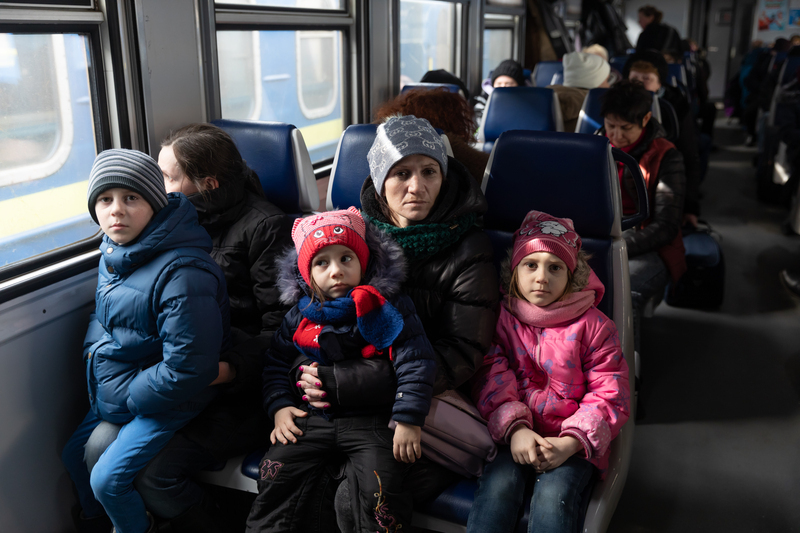
The trains out of Ukraine were running, but when and where they were going wasn’t clear at all. People crowded into stations and the streets around them. No-one was guaranteed a seat. They sat on the floors or stood in doorways, in corridors and in the toilets. Imagine having to transport someone on dialysis. Major charities such as the Red Cross were doing great work and they saved a lot of people, but they weren’t able to react quickly, so the small organisations came into the breach.
The young, able bodied and active are the first to leave the cities, leaving the elderly and disabled without support. In volunteers’ chat groups messages appeared about old people who had been left alone on the top floors of housing blocks without lifts. They find it difficult to leave familiar places. Often they don’t have the internet and their old-style phones have buttons. It’s hard to imagine people like this turning to the Red Cross on their own account. We persuade them to leave. We take them to their relatives, if they have any.
People generally go to Western Ukraine and gather in the Lviv Region. From there they can cross over to Poland or Hungary, but the question of accommodation remains. Many refugees are unclear about what they want, where they’re going and what's going to happen next. The search for accommodation is becoming an important part of volunteer work. You become an information aggregator as you follow the news chat groups and telegram channels. People need to be provided with food and medicines, as well as a feeling of security. Beyond that, you need to decide where their destinations should be and how they can get there.
Some refugees want to go to relatives in Russia, or pass through Russia to get to Europe, as other routes are closed to them. People leave Kherson via the Crimea. It’s not clear if these journeys are legal. People are taken through Russia to Georgia or the Baltic States. Charities are wary of sending people by these routes, especially considering the stories in the press about missing persons and long interrogations.
Priorities and difficulties
At the start of the armed conflict, people often fled their homes in panic, sometimes without their documents. While leaving, the commonest problem was communications; there isn’t internet access everywhere, not everyone has modern telephones, and people’s batteries were running out. Sometimes you had to accompany people more or less every step of the way, holding them by the hand. Helping refugees across borders was the most stressful part of the journey for coordinators. Our primary task was to provide security. Next, people encountered the language barrier and the loss of status that being in a new country entailed. For integration it’s important to be able to make informed decisions. You need to know how to enter the country, what conditions are like for refugees there, and what the career prospects are like. We help people get settled in when they have arrived; for some we pay a month’s rent, this is mostly in Europe. Sometimes we help them find a sponsor in Britain. Emigration, especially enforced emigration, always leads to a fall in standard of living and an inability to find employment fitting to people’s previous status. Some find it very hard to get used to the idea of receiving benefits, and the enforced inactivity seems strange to them. Some of them are itching to get to work, when they’d do better to take a break, recover their strength and start to learn the language.
It’s always harder to transport disabled people. Particularly people on dialysis machines or breathing apparatus. They are a priority, although there are also elderly people and mothers with small children. Women often don’t want to leave without their husbands, but men are not allowed to leave the country. It’s an unbelievably difficult emotional decision. We are unwilling witnesses to all these personal tragedies. But people have given us money with such enthusiasm that now we have got everyone out who we could. Some patients are in such severe conditions that speaking to them directly is impossible and all communication is via a guardian or nurse. The most difficult thing to do is get hold of the attending physician and to put them in touch with colleagues abroad. The moment of departure has to be carefully planned. We have access to two fully equipped ambulances which are ready at any money to travel to any location in Ukraine to transport someone in a serious condition, but in order to do this, we have to translate medical histories, provide care, prepare paperwork, and draw up a plan at least a month in advance.
People who have undergone sex changes, or who are currently transitioning, have difficult stories. Most often their documents show their birth gender, and transgender men are not allowed out of the country. Those who choose to try to leave are taking their lives in their hands. Quite often there are incidents of homophobia, when people refuse to shelter or transport gays or lesbians. In Lviv, one Airbnb host categorically refused to admit them, even when they had already paid for their rooms.
Medicines
Aid such as food, toiletries and non-prescription medicines flow freely across the border. However, in occupied cities there is an acute shortage of insulin, L-thyroxine hormone, antidepressants and psychiatric medications which need to be taken daily. This means that a black market springs up, with racketeers and speculators who sell medicines that should be distributed for free. Sometimes aid builds up in certain areas where it is stockpiled, and it doesn’t get through to those who need it. Sometimes the racketeers resell it. There are shortages of insulin, modern bandages such as Second Skin, plasma for blood transfusions and radar devices for finding casualties in collapsed buildings.
How it’s all set up
In the fund there is a central group of coordinators who take strategic decisions, allocate funds and have a global view. Then there are the sub-coordinators, who have more simple tasks, as well as the volunteers, who work on the ground. Decisions about large payments are subject to votes. Over time, a system has developed for checking volunteers and drivers, as they have to work with personal information. We ask people to provide documents. Volunteers burn out, and new ones come in their place. Fortunately, psychologists are providing us with assistance for free.
We record the story of every refugee family. The trickiest part is establishing trust when contact begins, although the most stressful part is crossing the border. People often turn off their phones and become unreachable. Each refugee has a coordinator and a case file with the details of relatives and accompanying circumstances such as pregnancy, breathing problems, diabetes or whatever it may be. In the file we record where we’re taking the person, what results have been achieved, and the status, which is either ‘open’ ‘in process’, ‘closed’, or, unfortunately, ‘missing’, although this is rare.
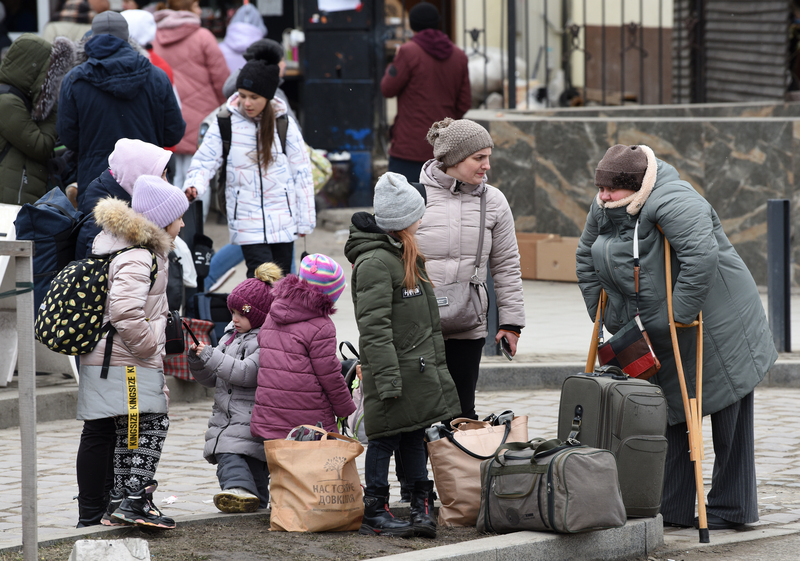
Ukrainians often don’t know the language or the laws, they’re lost and they don’t know where to run or what to do with themselves’
Maria Barell, founder of Ukraine Relief, a charity which helps refugees to settle in Britain
Personal initiative
The fund was founded to provide all possible help with groceries, clothes and medicines to those in need. In February I read the Facebook posts of friends who had crossed the Ukrainian-Polish border on foot with children. The story really affected me. I realised that the problem was huge and, while I knew I couldn’t change the big picture, I felt that I had to do something to help. The first thing that came to mind was to organise aid collection in my home. I put a small notice in a local shop and people started to come with boxes and bags, offering help. A company called Hermes (Evri) supported us, they took care of delivery of the aid to the Polish-Ukrainian border. Now we have several drop off points for donations in Essex; on Billericay High Street and at Ramsden Bellhouse Post Office.
Seemingly straightforward
The Fund’s problems are not serious, but they are unexpected. When we attempted to buy medicine in the UK it became clear that one person could buy no more than two packs at a time. There was an unpleasant incident at Lidl when we weren’t allowed to take a large quantity of goods from the shelves as the manager decided there would not be enough left for other shoppers. And this ‘large quantity’ was only two boxes of pasta. We were told off like schoolchildren, which was a bit jarring. It turned out that we should have written to the store manager and ordered the goods in advance, but we were in a hurry because we had to send everything off to the Ukrainian border in a car that was leaving that very evening.
When refugees started to arrive in Britain, another problem came to the fore. It’s good when people have family members to turn to who can help them with most of their needs, but it often turns out that they haven’t got pushchairs, car seats, children’s highchairs or cots. When they arrive at their sponsors’ accommodation, Ukrainians are not always prepared for life in a rural area where it’s difficult to get around without a car. We recently helped one lady find a pushchair, because she is living two miles from a bus stop and it’s unbelievably difficult for her to even leave the house with her baby. Life in rural areas of the country requires a car, and the people who are arriving are mostly pensioners and young women with children. Practically none of them have cars, which means it’s not so easy for them to get to shops, to schools, to doctors, or to government offices to apply for documents. But far from all sponsors are ready to drive their guests around and accompany them everywhere. Ukrainians often don’t know the language or the laws, they’re lost and they don’t know where to run or what to do with themselves. When necessary, we pay for legal representation, interpreters and unexpected costs. We help them deal with the system, we organise events for refugees, and we either look for or buy necessities for the children. We try to introduce people to each other, so that they don’t feel so isolated. We help them to find work and apply for benefits.
Our aim is to create a local place where they can come together. We put those who want to help in touch with those who need help.
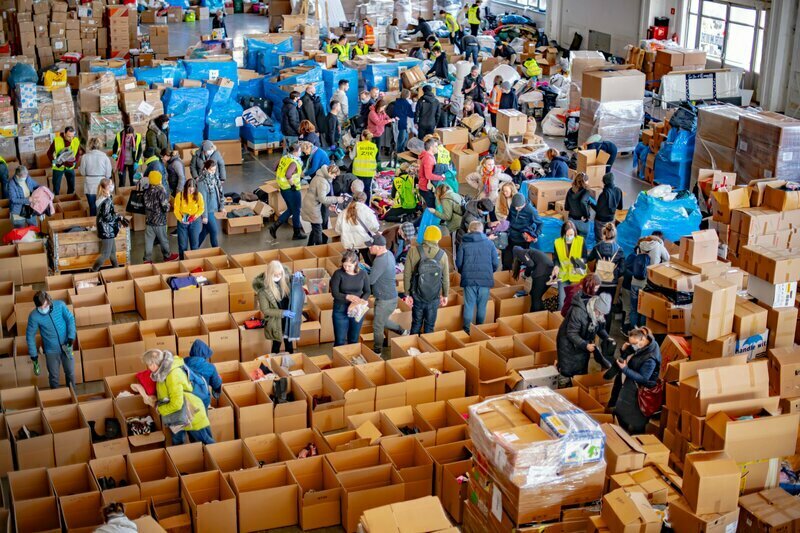
‘Most of them keep on reading and watching the news, and what they witness traumatises or re-traumatises them.’
Yulia Morozova, co-organiser of Life Boat, a fund providing psychological support to refugees and volunteers
Important support
The Life Boat Psychologist and Volunteers’ Association arose spontaneously as a reaction to what was happening in Ukraine, we rushed in to help at a refugee camp near the border, which is near the Polish village of Hrebenne. The Ukranians were welcomed warmly; food, medical care and even free sim-cards were provided, but there were not enough Russian speaking volunteers, which created certain difficulties for communication. Also, there was no professional psychological support; I was the first specialist to arrive, yet this help is vitally important both for burnt out volunteers and for refugees who have gone through the shock and trauma of everything that they have seen and experienced. The constantly changing of faces at the camp are also hard for people with Post Traumatic Stress Disorder (PTSD) to adjust to. This is why it is better to assign a specific person to each refugee. This can be explained by the Imprinting Effect, where familiar figures make an impression on the consciousness, leading to trust and attachment. However, at the same time, it’s impossible to send volunteers to the border for too long as they burn out.
It was decided to collect money from friends and acquaintances to pay for Russian-speaking volunteers’ travel costs. As a result, over two months, psychologists, lawyers and other concerned people went to help, support, interpret and accompany refugees as they applied for the documents necessary for life in exile.
We’ve now gone through all the registration procedures and we’ve set up a non-profit organisation in the UK. We’re running adaptation programmes for recent arrivals to these islands, where we do individual work with trauma victims and those suffering from PTSD. We work with qualified Russian and Ukrainian speaking psychologists, also, we provide free support for all volunteers, helping them to cope with burnout and recuperate their strength. We are also developing a programme intended for British sponsors, which facilitates intercultural understanding and minimises conflict.
The psychological effect of trauma
There are professional psychologists in our team who go through psychotherapy and supervision, which equips them for this difficult work. Helping PTSD sufferers requires a minimum of ten sessions. They can provide professional help to both volunteers and refugees. The latter, on finding themselves in a foreign country, encounter linguistic, legal and career related problems, whilst also experiencing shock and apathy. Our main aim is to preserve people’s ability to live in internal harmony, despite the difficulties and obstacles, and to comfort them, give them support and show them different perspectives.
Having found themselves in a safe place, people are initially relieved, but then they begin to experience feelings of extreme exhaustion as well as apathy, shame and guilt over their departure, and these do not tend to get better over time. Even though the refugees have escaped physical danger, they are still vulnerable as they are living in other people’s houses, in a strange environment, and this causes colossal stress. Not everyone has the knowledge or education to deal with the pitfalls of the local bureaucracy. So far in Britain, the support on offer isn’t well organised or structured, there are few societies to coordinate matters, and not many orientation events are held for recent arrivals.
Refugees cannot live and work as they are accustomed to, which means a high likelihood of depression, irritability and aggression. Problems arise with sleep and memory, excessive alarm and tearfulness; they cannot fully process what has happened, they lack self confidence or acceptance of their changed circumstances. All the time they are waiting for the moment when they can go home and resume their normal lives. Even the food which is available affects their mental state. This may seem silly, but everyday food in England is unusual for Ukrainians, and they may lack the money or facilities to buy and prepare food for themselves. A feeling of uncertainty takes hold of people and they start to wonder what to do with their lives and how they should adapt. They feel that they are living in constant expectation of being able to go back home, with their lives seemingly on pause. Most of them keep on reading and watching the news, and what they witness traumatises or re-traumatises them as they see terrible things but they can do nothing about it.
In the difficult situation which has developed, our aim is to give people the opportunity to adapt and find new meaning in their lives, to help them cope both with the endless stress and the consequences of PTSD.
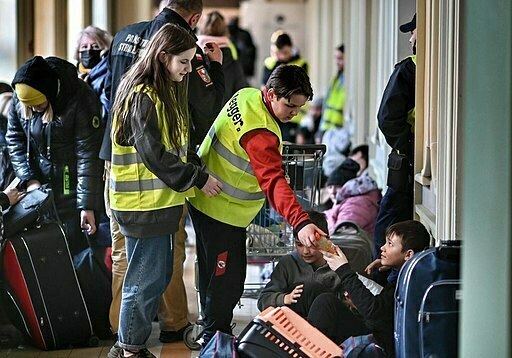
Part Two. What the refugees say.
‘There is the feeling that on the official level, no one wants to help us, they ask strange questions, they obfuscate and they’re not interested in you at all’
Anna, a stylist, left Kyiv with her mother and daughter and moved in with her cousin (her husband, father and brother have stayed behind). She now lives with her English sponsors in a separate house on the grounds of an estate.
An important decision
We were at home in Dnipro and I woke up at about four in the morning because the balcony door had banged loudly. I thought the petrol station had exploded, and then I read on the internet that the war had started. It was a shock. I didn’t know where to run or what to do. In the morning I saw that lots of people were going out of their homes with suitcases and they were leaving. But I was afraid to leave, because the newspapers and the chat groups were all saying that there was shelling. My daughter was writing to her classmates on their children’s chat group about everything that was going on. It’s so strange when your nine-year old daughter is discussing a war. At first we ran into the basement every time we heard a siren. Every morning there was a roll call in the chat group, while we were all checking if everyone was ok. Watching the news was unbearable, we couldn’t believe that civilians were being hit by the shelling. People started to leave en masse, there were a lot of accidents on the roads. Many people were leaving for Poland, Bulgaria was offering three months full board in hotels. But to sit there and do nothing for so much time was a direct route to madness. For me personally, going off into the unknown was more frightening than staying. So in those early days we left town and went to stay with friends on a nearby farm. Our way of life changed, we helped our friends with the farmwork, I was in the dairy with the cheeses, and my husband helped out where his strength was needed; a few times he took the sheep out to pasture. And then my cousin called from Britain and suggested that we joined them on a family visa.
Evacuation
We got our documents very quickly, but it was very difficult to part with my husband, father and brother. If it hadn’t been for my child, I would have stayed. We went on the train via Poland. We’d heard that the trains were jam packed, with everybody on top of each other, and that you could only take a small bag with you, but at the moment of our departure, extra trains appeared and it was possible to travel in comfort and with baggage. This was important for me, because I took with me all my tools, without which I wouldn’t have been able to do my job in a foreign country. It took a long time to get to Poland, about forty hours, but when we got there they welcomed us very warmly and joyfully. Everything was wonderfully organised, with rest areas, cots for babies, phone chargers, home cooked food, toilets and free transport across the country. Wizzair had laid on free flights, so when we flew to England, we only paid for the baggage. We were lucky because we could plan our journey, whereas many people just upped and left without their things, without any documents or money.
It’s not that England received us coldy, but we did end up in a confusing situation. We had decided that the main thing was to leave Ukraine, and that we’d sort the rest out when we got to the UK. The plan was to rent a flat and work at home to support myself, but the first problem that we encountered was that no one would rent us accommodation. Either my official salary had to be twice as high as the cost of rent or I had to have either a confirmed income or a guarantor. My cousin was prepared to be my guarantor, but to do this we had to pay for half the year’s rent in advance, which none of us could afford to do. So we ended up living with my cousin and her husband in a flat above a pub, which was only intended for the publican’s family, and not at all for me, my mother and my daughter. It was illegal. The boss of my cousin’s husband said he’d look the other way, but only for a month.
Sponsors
My cousin managed to get in touch with an organisation which helped us to find a sponsor, and within a week we’d found accommodation. We live in a guest house on the grounds of a stately home. These very attentive and caring people have taken us in for half a year, and they’re helping us to get settled in. They have brought us garden furniture and fresh milk. We haven’t signed any documents, they aren’t getting anything from the government for sheltering us, but I am sure everything will be alright.
When we'd just arrived I was desperate to find a flat so I wrote messages to everyone, including the town council. They sent us round in circles with a minimum of information, nothing was clear. My cousin dealt with them, I couldn’t have coped with it myself. We wrote to the councillors and one of them replied. In the end an application for a council house was made at the start of April and at the end of May we were invited to a meeting. It was lucky that we had already found sponsors by then. The council agreed to process our case and told us to come back a month and a half before the sponsor programme ends.
Plans for the future
I had my own business, clients, salon and family. Right now I’m very busy with my work; I’m doing eyebrows and lashes and I manage my Instagram account. When I arrived I went to the job centre and started to actively look for a job, but there is the feeling that on the official level, no one wants to help us, they ask strange questions, they obfuscate and they’re not interested in you at all. Now I’ve signed up for benefits, registered as self-employed and agreed to work at a beauty salon next to my home, but I need to verify my certificate and I still don’t know how to do that. I am really feeling that I need to improve my language skills to have a full life here as even such mundane things as buying a sim-card can grow into huge problems. I’m looking at courses at the local college. Maybe I can acquire some extra skills, but first, I have to get a place at a good English language school.
This whole situation is very stressful for my daughter. She worries if she sees I've been crying and she really misses her father. Recently, they finally assigned her to a school, and I really hope she’ll like it there.
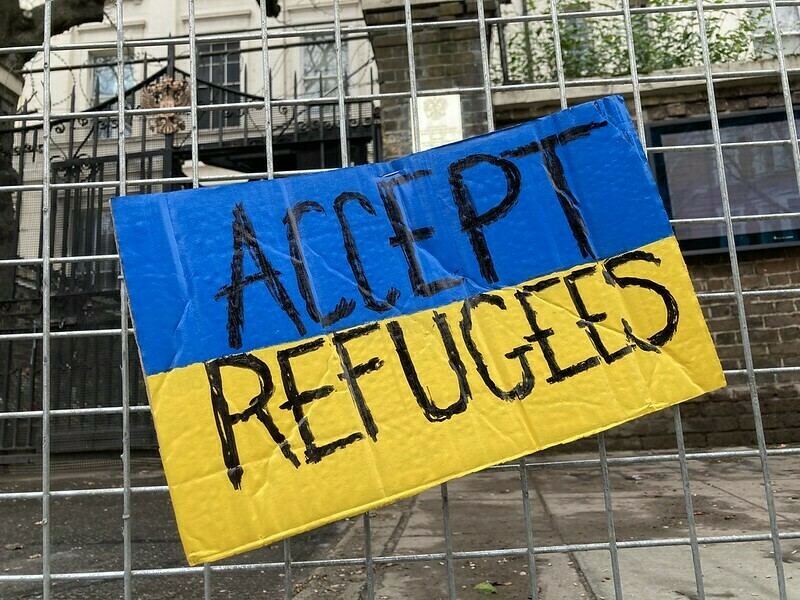
‘I’m not worried about my son, England is a good place for him’
Alena, a photographer, left Kyiv with her disabled child and joined her mother and her husband. She is a single mother.
The objective was to get out
I am a photographer. I used to run my own business and I had an established client base. My son Nikita was going to his specialised school and everything was OK. On February 24 I got a call telling me the war had started. It was a shock. I live alone with my son who has a rare genetic disorder which requires regular medical care. He has certain mental and physical disabilities. Panic washed over me. I packed a suitcase in a rush. I wanted to go to Borodyanka to join my relatives, but over the phone, my mum convinced me to stay in Kyiv.
My flat is on the twenty-third floor and it wasn’t safe to stay there because rockets usually hit the upper floors. We moved in with a friend on the fifth floor and we didn’t go up to our flat anymore. Information came in from the news. It was very frightening, I couldn’t eat or sleep for almost eight days. We tried to stay in the basement and go up to my friend’s flat only in cases of extreme need as, when the sirens sounded, often the lifts were turned off and I couldn't use the stairs with my son who has trouble walking. No one helped me. Some time later we ended up in a kind of church. The thought of leaving by car terrified me, but there was no other way. My son requires regular administration of a certain medicine by drip. Even before the military action started, stocks of this medicine had run out in the country. My son had gone without it for three weeks, toxins were beginning to build up in his body and he didn’t feel very well.
On the day when they announced that we could leave, we went to the station with my cousin and her children. There was no timetable for the trains. They were cramming twenty people in each compartment, others were in the doorways, on the floor and in the toilets. They weren’t letting men on, and there were fights. It was standing room only, and I had to make a fuss to get Nikita sat down. There was no pampering, it was a terrible journey. Things were easier when we got to Poland. Our professor got in contact with a doctor in Cracow, and a week later, they put Nikita on a drip.
England and local medicine
We got on the train out of Kyiv on March 25, we spent three weeks in Poland and then we flew to London, where my mother has already lived for eight years with her husband. As soon as the war started, they invited us to England, but at first we didn’t know what kind of visa to apply for or how to fill in the forms. My mother’s husband really helped her, he even wrote to a local councillor to ask them to issue my visa more quickly.
On the day that we arrived, we went straight to a therapist to register and to receive some medicine as we had already missed a lot of procedures. But I really couldn’t understand why registration and getting an appointment to see a specialist was taking such an awfully long time. We had to translate a huge amount of medical notes from my son’s previous doctor, and we waited.
My son has a very rare illness and in Ukraine he was receiving therapy on a permanent basis. He went on a drip once a week, the cost of this medicine is thirteen thousand pounds. He has very many problems; deformed joints, complications with his heart and all of his organs are suffering, but the therapy helps to offset the damage caused by this illness. My boy has some mobility problems, but he can wash and dress himself. He has certain cognitive problems, so naturally he needs constant care and attention, I can’t leave him alone.
An unexpected problem came up the first time he went on a drip in England. Nikita’s veins are hard to find and put a needle into, and it turned out that there was nobody at the hospital who could do it. So they did it by intravenous (IV) catheter instead, but the medicine didn’t get into his bloodstream properly that way and it went to waste. They told us that, as the procedure hadn’t worked, they wouldn’t do it again for the time being. I was shocked, because we had been through so much bureaucracy and I’d translated so many documents! I was at the end of my tether. It was a violation of my child’s rights, the same as refusing a diabetic insulin. But they said that they didn’t have the right to put him through the suffering of having repeated IV catheters. In the end, we made the decision to put in an implanted port, a small tube which is inserted into a vein surgically. This operation was done quickly and it went well, so we were very pleased. Nikita was prescribed additional tests, and now a nurse comes to our home to give him a drip. We don’t pay anything at all, all our medical costs are covered by the state.
Plans for the future
We still don’t know what school he’ll be going to. Nikita is twelve and we’re waiting for the specialists to choose a suitable place for him, but I’m not worried about my son, England is a good place for him. On the downside, it’s true that here it’s more difficult to arrange physiotherapy, preventative procedures and developmental support. In Kyiv, Nikita had a rehabilitation specialist who regularly gave him stretching exercises and kept him fit, but here this kind of support is extremely expensive. Nevertheless, it’s more me who’s having the problems. Of course, this wasn’t a journey into the complete unknown for me, I have my mother here, she had already told me enough to give me an idea of where I was going and what to expect. I need to start a new life, but I’ve left everything behind in Ukraine. It’s unbelievably difficult emotionally. I’m having problems with the language, but I will study it. I plan to do the same work as I did in Kyiv, this is what I want to do. I’m starting everything again from scratch, but I think I'll cope.
‘It’ll get really interesting in half a year when the sponsor contracts run out’
Irina Bormotova, senior recruitment consultant at the Groundwork fund, which helps refugees and migrants in Britain
Area of responsibility
For twenty years now, I have worked at a fund which helps recently arrived refugees find work. We support migrants from non-European countries such as Syrians, Afghans and now we’re supporting Ukrainians too. Since February 24, I’ve been dropped headfirst into events, and my heart hurts for the people affected. We have a good fundraising programme, but to cover all areas of adaptation we’d need something in the order of 800 thousand to a million pounds. We have already organised something similar for refugee job seekers, and this programme has demonstrated its effectiveness. At the moment I’m trying to raise as much money as possible for the Ukrainians. There are already more than sixty thousand of them in the country. About three hundred people have used our fund, which is just a drop in the ocean. There are other funds with similar aims, we work especially closely with a volunteer organisation called Trafalgar Girls; we share information and help refugees in particularly difficult situations.
There was an enormous response to the situation in Ukraine, people were ready to help and a great many volunteers came forward, it was wonderful. When Ukrainians arrive here, they are lost, they don’t understand where they are going, what’s waiting for them or what they should do. There are neither any clear instructions nor a unified system and not even the official services are always aware of all the laws and regulations. But I think that specialists should help. First of all, this is because they understand their responsibilities. They go through a criminal records check with the police (a DBS check), they do training and they are always going on courses to ensure they can work with vulnerable people. Some agents and consultancies have had time to spring up which help people to fill in forms for money. That’s disgraceful! Overall, the wave of good feeling is receding, the topic is disappearing from the front pages of newspapers and even negative stories are appearing. Why are the tabloids writing that a Ukrainian woman has seduced a British woman’s husband? You might think British women don’t cheat on each others’ husbands. But It’ll get really interesting in half a year when the sponsor contracts run out.
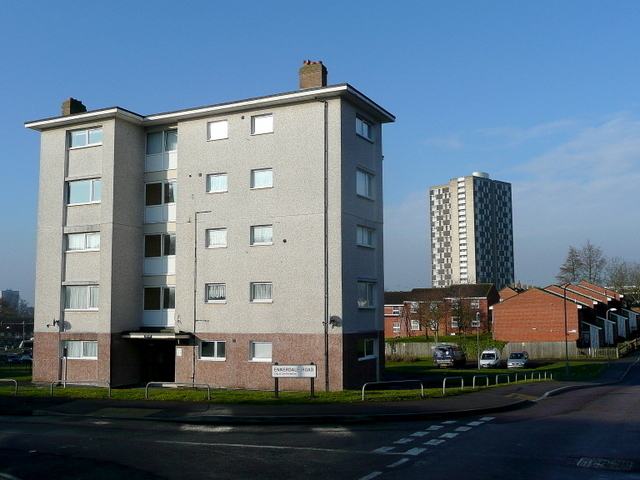
Out on the street
The council housing system is stretched beyond capacity. But soon a new burden will fall to it as the sponsor contracts are only for half a year, and far from all the sponsors will want to prolong them. As things stand, about twenty percent of newly arrived Ukrainians already have nowhere to live. When the United Kingdom opened its doors to refugees, the legal criteria for sponsors were not clearly defined, and, in fact, if they throw people out on the street, they face no legal penalties. It goes without saying that sponsors should be checked by the state and they should fit the stated criteria, but in practice, it’s not at all clear how these checks take place. Recently, a lady called me to say that she was living with her daughter in an attic which was only accessible via a narrow, wobbly stairway. She was frightened of going down. This would seem to be a health and safety matter, but the Council was looking the other way.
Another sponsor just decided not to go to the airport to meet their family, who had four children. They were Afghans but they came here from Ukraine, and on their documents it said that they were Ukrainian refugees. When I got through to the sponsor, I asked them why they had abandoned these people. The answer I received was that by sponsoring them, they had got them out of the war, and they thought that with that, their mission was accomplished, and any further help was up to the Council. The Migration Service ended up housing them in a hotel near Luton airport. It’s an industrial area and there is no infrastructure at all; no doctors, schools or nurseries. No one in the family speaks English. One of the activists, Masha McMinn, raised funds and paid for them to have English lessons online. But now the issue of housing them needs to be solved.
Footballing
Unfortunately, not all sponsors behave responsibly, and it’s very hard to check them beforehand. People find each other on sites, the refugees come here on sponsor visas, and then it turns out that the two parties’ expectations don’t coincide. We recently helped a family of five to get settled in. They had an official sponsor who provided them with accommodation in his own home, but one Sunday he just kicked them out because they were using too much electricity. I called the police, but they refused to intervene, saying that they were overworked. So once again, Masha McMinn raised funds and Trafalgar Girls paid for a hotel for them. I called the out of hours council line, but when I eventually got through, they told me to contact the sponsor’s local council. I called Woolwich Council all morning, but when I finally got through, our issue was kicked back and forth like a football. No one in particular thought it was their business. Only a few hours later did I get through to the housing department, where they told me that the family should come to them. So off they went, but when they got there it turned out that no one was expecting them and no one understood them, so I had to sort it all out over the phone and it took all day. In the end, the council found an interpreter, and the family was assigned housing in Kent.
Sometimes it’s not only public services that play this game of bureaucratic football, but charities too. Imagine ringing up a charity in complete desperation and with no understanding of the local system, and being told that you’re not signed up for the sponsor programme in their area, so they can’t take your case. Also, sometimes refugees go off to look at housing on the other side of London or out of town and they spend vast sums on transport, sometimes more than £100, because they don’t understand how public transport works here. So this ‘footballing’ of people goes on and on.
Hidden stumbling blocks
The problem isn’t just that people are thrown out on the street, but also that they are tied to the address of the housing the sponsor provides, which is required to receive £200 in support from the state. Next comes the issue of applying for benefits. It takes five weeks to make an application for Universal Credit. People have to live on something during that period, and housing problems delay things still further. Refugees arrive here either on family or sponsor visas, or on the recently created extended visa. This is why many people are already coming to the end of the validity periods of their visas, and not everyone knows that you have to apply to extend them.
Refugees often lose time due to their lack of knowledge of these details. For example, they wait two weeks for their bank accounts to be processed, when actually, there is a fast scheme for them, when everything is done in twenty-four hours, but not all banking staff know about it. There are so many small issues that require attention that it takes a lot of time. Incidentally, only people who live with sponsors receive £200, not those who live with their families, who receive nothing, which isn’t fair. A petition has already appeared asking for equal treatment.
The Monster Sponsor
I help refugees to find work and motivate them. My responsibilities include searching for attractive vacancies, opportunities to get involved helping us, training programmes and employment opportunities. We only offer free training schemes, either funded by the state or by major partners, we accredit qualifications and we see what is best for people, so that rather than losing qualifications, they acquire new ones. I suggested to two young Ukrainian women that they did a course in hospitality, after which they would be offered jobs. The choice of professions on offer is wide ranging, from security guards to baristas. They were very pleased and they told their sponsor about it. Unfortunately, this lady made a scandal out of it. She accused the girls of taking work from unemployed British people and said they didn't have a right to benefit from public funds. Instead, they should work as cleaners or barmaids. And this was an educated woman, a doctor. I was shocked. The girl asked us to find another sponsor and wrote a complaint to the Council, which is now under review.
How to go on
Overall, it’s difficult to get a place in social housing now, the stock of these properties was already extremely limited, even before this crisis. The only bright side is that the state is paying refugees benefits. As a representative of the Fund, people ask me to come with them to the Job Centre, where I share my action plans for situations like this, as people just don't have this information, which has never been systematically gathered in one place. There are many subtleties to take into account. People who have been thrown out on the street often go to their friends or relatives, but you categorically must not do this, as in this case you will not be recognised as homeless and you won’t be helped. I think the number of refugees with nowhere to live will only grow. No law can prevent this. I worry that when the locals realise what’s happening, they’ll feel very resentful towards the refugees; inevitably people will start murmuring ‘we’ve been waiting for a council house for ten years, and these people who have just arrived are getting them’. It’s wonderful that people have the desire to help, but the system has demonstrated how dysfunctional it can be, as it failed to predict the seemingly obvious.

